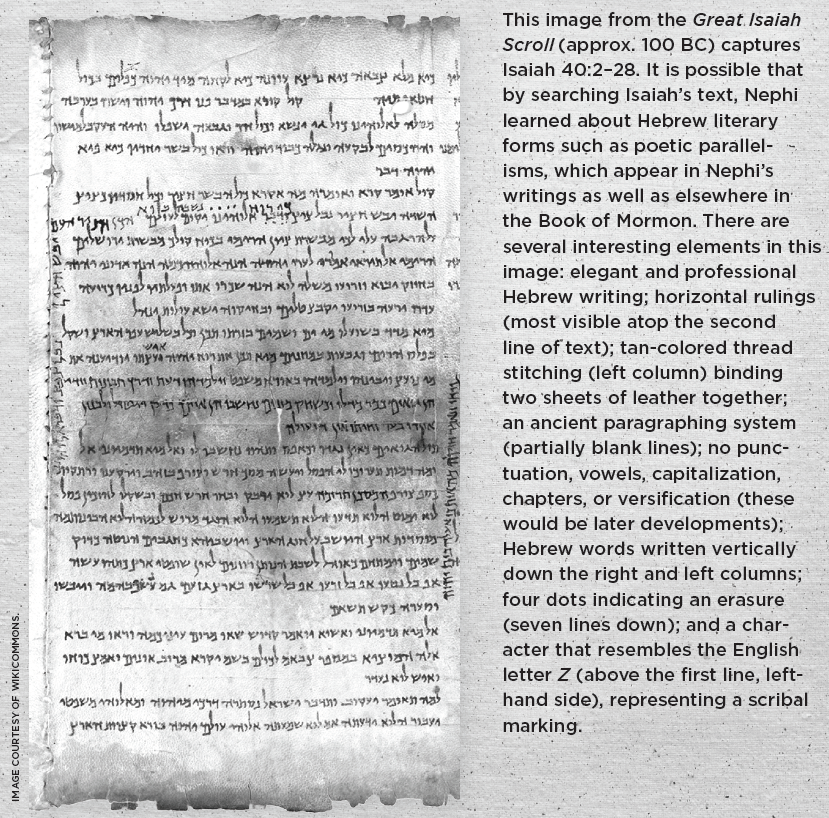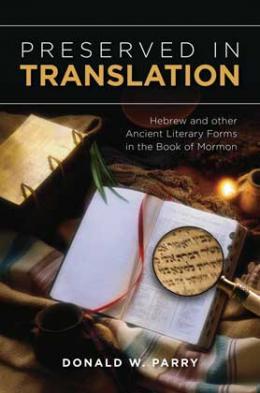Conditional Clauses
Donald W. Perry, “Conditional Clauses,” in Preserved in Translation: Hebrew and Other Ancient Literary Forms in the Book of Mormon (Provo, UT: Religious Studies Center, Brigham Young University; Salt Lake City: Deseret Book), 125‒28.
"if he saith unto the earth—Move—and it is moved" (Helaman 12:13)
Conditional clauses in English are sometimes formed with an if-then construction. For example, “If you insist on going, then we will go with you.” Biblical Hebrew often forms such clauses by using and instead of the expected then.[1] Thus the example would read, “If you insist on going, and we will go with you.” Bible translators will sometimes change the Hebrew formulation to more standard English. Here are four instances[2] of if-and clauses from the Old Testament, both from the King James Version and from a literal English rendering of the original Hebrew:
“If God will be with me, . . . then shall the Lord be my God” (Genesis 28:20–21). Original Hebrew: “If God will be with me, . . . and shall the Lord be my God.”
“If ye will obey my voice . . . , then ye shall be a peculiar treasure” (Exodus 19:5). Original Hebrew: “If ye will obey my voice . . . , and ye shall be a peculiar treasure.”
“If the children of Gad and the children of Reuben will pass with you . . . ; then ye shall give them the land” (Numbers 32:29). Original Hebrew: “If the children of Gad and the children of Reuben will pass with you . . . ; and ye shall give them the land.”
“If I find in Sodom fifty righteous within the city, then I will spare all the place” (Genesis 18:26). Original Hebrew: “If I find in Sodom fifty righteous within the city, and I will spare all the place.”

The earliest extant manuscripts of the Book of Mormon have several instances of if-and clauses.[3] These are awkward in English but are correct and idiomatic in Biblical Hebrew. Royal Skousen has noted that such “Hebraistic constructions . . . for the most part [are] unacceptable in modern English, . . . which has led to their removal by editors of the text (and occasionally by the manuscript scribes).”[4] Because of their awkwardness, in most cases the if-and expressions were changed to Standard English by simply removing the and in later printed editions of the Book of Mormon. Following are examples of if-and clauses from the early Book of Mormon text, along with notes on their subsequent removal.[5]
“I say if ye should serve him with all your whole soul—and yet ye would be unprofitable servants” (Mosiah 2:21). To improve readability, the and was removed beginning with the 1837 edition of the Book of Mormon. Thus the passage currently reads, “I say, if ye should serve him with all your whole souls yet ye would be unprofitable servants.”
“but if ye will nourish the word . . . and it shall take root” (Alma 32:41). The and was removed in the 1837 edition. The passage now reads, “But if ye will nourish the word, . . . it shall take root.”
“and thus if ye shall say unto this temple : it shall be rent in twain and it shall be done” (Helaman 10:8). The and was removed in the 1837 edition, and the passage now reads, “And thus, if ye shall say unto this temple it shall be rent in twain, it shall be done.”
“and if ye shall say unto this mountain : be thou cast down and become smooth and it shall be done” (Helaman 10:9). The and was removed in the 1837 edition, and the passage now reads, “And if ye shall say unto this mountain, Be thou cast down and become smooth, it shall be done.”
“yea and if he saith unto the earth : move and it is moved” (Helaman 12:13). The and was removed in the 1837 edition, and the passage now reads, “Yea, and if he say unto the earth—Move—it is moved.”
“and if ye shall ask with a sincere heart with real intent having faith in Christ and he will manifest the truth of it unto you” (Moroni 10:4). The and was removed in the 1837 edition, and this passage now reads, “and if ye shall ask with a sincere heart, with real intent, having faith in Christ, he will manifest the truth of it unto you.”
These if-and expressions are yet another evidence that the Book of Mormon came from a Hebrew or Hebrew-like source. They belong to a class of “non-English Hebraistic constructions [that] are typically not found in the King James translation (or other more recent translations) of the Old Testament, but . . . can be found in the original Hebrew underlying the English translations.”[6] This finding underscores the position that the Book of Mormon’s use of Hebraistic literary forms cannot simply be attributed to Joseph Smith’s familiarity with the English Bible.
Notes
[1] See analysis and examples in Waltke and O’Connor, Biblical Hebrew Syntax, 526–27; Ewald, Syntax of the Hebrew Language, 274–76; Joüon and Muraoka, Grammar of Biblical Hebrew, 628; and Lambdin, Introduction to Biblical Hebrew, 276–78.
[2] For additional examples from the Old Testament, see Lambdin, Introduction to Biblical Hebrew, 276–78; and Skousen, History of the Text of the Book of Mormon: Part 1, 363–65.
[3] See the analysis in Skousen, “Hebraic Conditionals,” 201–3; and Skousen, History of the Text of the Book of Mormon: Part 1, 368–70.
[4] Skousen, History of the Text of the Book of Mormon: Part 1, 361.
[5] The Book of Mormon examples in this subsection are from Skousen, History of the Text of the Book of Mormon: Part 1, 368–70; italic for emphasis is mine.
[6] Skousen, History of the Text of the Book of Mormon: Part 1, 361.
